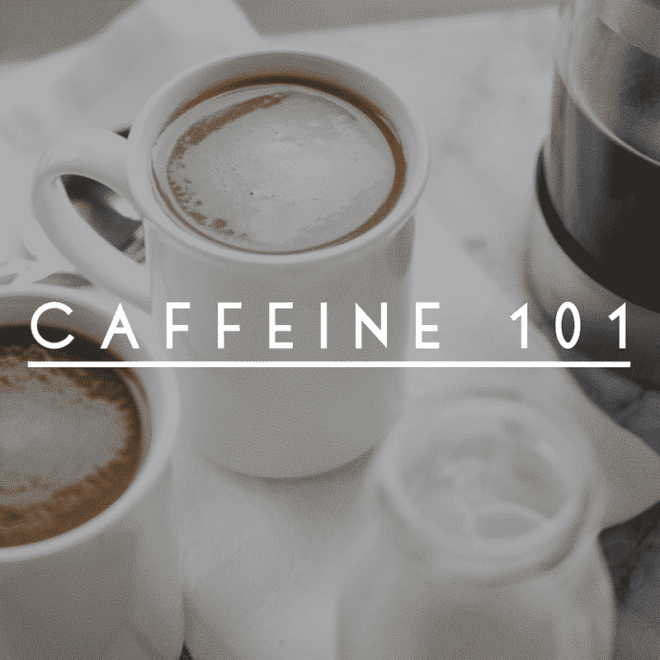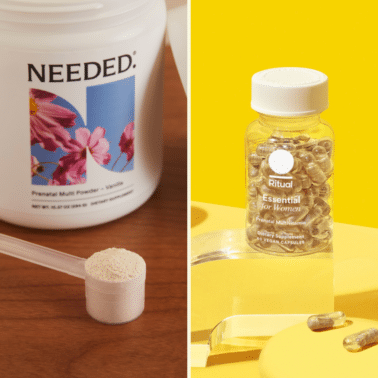Today we’re deep diving into caffeine 101 – how it affects the body, what the ideal relationship with caffeine should look like, and the best sources of caffeine!

Oh, caffeine. Few things are better than that first morning sip of coffee or the little extra jolt of a caffeinated beverage to get you through your day. As much as many of us love caffeine though, it is important to take an informed look at your relationship with it, and see how it is affecting you. Now, we aren’t saying all caffeine is a bad thing, in fact, the right amount can actually be quite good for you! However, too much caffeine each day can start to have a negative effect on your body, especially when it comes to your sleep.
If you’re wondering how caffeine may be affecting you, read on to learn more about how it works in the body, and how you can experiment to find the right amount of caffeine for you!
The Effects of Caffeine on the Body
Let’s get down and get started with the goods in this caffeine 101. Most of us think of the morning cup of coffee as giving us a needed jolt of speed to get the day going. But in reality, caffeine doesn’t cause the body to speed up; instead, it tells the body not to slow down. To understand how this works, you need to get to know a little compound called adenosine. Naturally produced by the body, adenosine’s main function is to act as an inhibitory neurotransmitter. This means that it attaches itself, via its very own personalized receptor, onto a nerve ending in the brain. Once it attaches, it tells the neurons to slow down. This is a totally natural process. The body will present a higher concentration of adenosine while it prepares for rest (coinciding with a rise in melatonin and a drop in cortisol) and a lower concentration while active.
To the body, caffeine happens to look a lot like adenosine! In fact, you could almost call it an adenosine impostor. It attaches to the special adenosine receptor on the nerve ending but does not trigger the same slowdown effect. Therefore, the neurons (which have a natural inclination to go fast) keep firing at high speed. From here, in essence, the body responds to the frenzy of firing neurons by triggering a greater release of dopamine and glutamate. Dopamine stimulates feelings of pleasure and motivation, while glutamate stimulates cognitive function (think memory and learning). Eventually, the pituitary gland catches wind of all the activity and starts to release more adrenaline. Adrenaline, in turn, causes the body’s heart rate to increase, triggers the liver to release more sugar into the bloodstream for energy, tightens muscles, and causes blood vessels to constrict so that more blood can flow into the muscles—preparing the body for fight or flight. This is why, when you consume more than a moderate amount of caffeine, your hands start to feel a bit colder (due to blood vessel constriction) and your heart rate increases. Though pleasure and cognitive function may be stimulated, caffeine does stress the body. While there’s nothing wrong with a moderate caffeine intake, excessive consumption, especially throughout the day, can keep the body from slowing down and preparing for restful sleep.
The Ideal Caffeine Relationship
Striking a healthy balance with caffeine is possible! It may take some adjusting, but all you need is a little extra awareness and then some practice. Here are some signs of a healthy relationship with caffeine:
- Though you enjoy drinking caffeine, your body doesn’t necessarily depend on it.
- You can skip coffee or tea for a day and not suffer a headache or other detox symptoms.
- You intuitively stop consuming caffeine before becoming jittery, shaky, or distracted.
- You drink it only in the morning and prefer water, sparkling water, or herbal tea during the rest of the day.
Caffeine Consumption Best Practices
First, it’s important to note that you are the only one who can determine whether caffeine is right for you! This caffeine 101 is meant to educate and empower you and NOT to say that caffeine is or isn’t right for you. If you suspect that your caffeine intake needs adjusting, I recommend that you take a focused look at how the timing, amount, and source impact your day. To track your observations and make informed adjustments, take note of the following:
- Amount and type of caffeine and time it was consumed.
- Proximity of consumption to a meal: was it consumed before, during, or after eating?
- How your body feels during, just after, and two hours after consumption: relaxed, euphoric, jittery, shaky, focused, distracted, etc.
Make adjustments to your caffeine intake, playing with the amount, timing, and type, until you settle on a routine that speaks to the ideal caffeine relationship.
Ideal timing: My general rule is to consume caffeine only in the morning hours, or the first half of your day if you work an alternative schedule. If you feel that you may be especially sensitive to caffeine, I recommend consuming it only with or after a meal. After noon (or after your midday meal), try to avoid all caffeine.
Ideal amount: Again, as a general rule, most people should try to stay under 200 milligrams of caffeine a day. Definitely try not to exceed 300 milligrams. Three hundred milligrams of caffeine is equivalent to approximately 16 ounces (a medium or “grande”) of hot dark roast drip coffee, one serving of store-bought cold-brew coffee, or four shots of espresso.
Ideal Sources:
- Store-bought cold-brew coffee: 270 mg / 4 oz concentrate
- Boiled or percolated coffee: 200 mg / 8 oz
- Blond-roast drip coffee: 180 mg / 8 oz
- Dark-roast drip coffee: 145 mg / 8 oz
- French-pressed coffee: 108 mg / 8 oz
- Espresso: 75 mg / 1 oz
- Decaf coffee: 15 mg / 8 oz
- Oolong tea: 65 mg / 8 oz
- Chai tea: 50 mg / 8 oz
- Black tea: 47 mg / 8 oz
- White tea: 40 mg / 8 oz
- Matcha tea: 34 mg / 1 g dried
- Green tea: 25 mg / 8 oz
- Decaffeinated black tea: 12 mg / 8 oz
Not ideal sources:
- Coffee in excess (3+ cups a day)
- Tea in excess (3+ cups a day)
- Soda (regular or diet)
- Energy drinks or shots
- Caffeine supplements
If you’ve been wondering whether your caffeine consumption may be affecting your sleep, causing jitters, or increasing anxiety, take this week to experiment with how your normal caffeine makes you feel vs. a reduced amount on another day. Similarly, if you’re regularly sipping on afternoon coffee and find yourself unable to fall asleep each night, trade out your coffee for decaf or herbal tea and see what happens to your sleep. As you continue to experiment and record your results, you’ll find the ideal amount of caffeine for you!
I hope this caffeine 101 helped you to start further understanding caffeine! For a deeper dive into these topics, you can check out the Fed & Fit Book .












I’m curious about why dark roast is specifically listed as an ideal source of caffeine. What about light or medium roasts? Thank you!!
As a new mama, what is your take on caffeine while pregnant?
Hi Juli! Caffeine is highly individualized to each person, so I would definitely talk to your doctor before making any final decisions on caffeine. That being said, Cassy personally did fine with one cup of coffee per day during her pregnancy, and the general rule of thumb is under 200 mg per day!